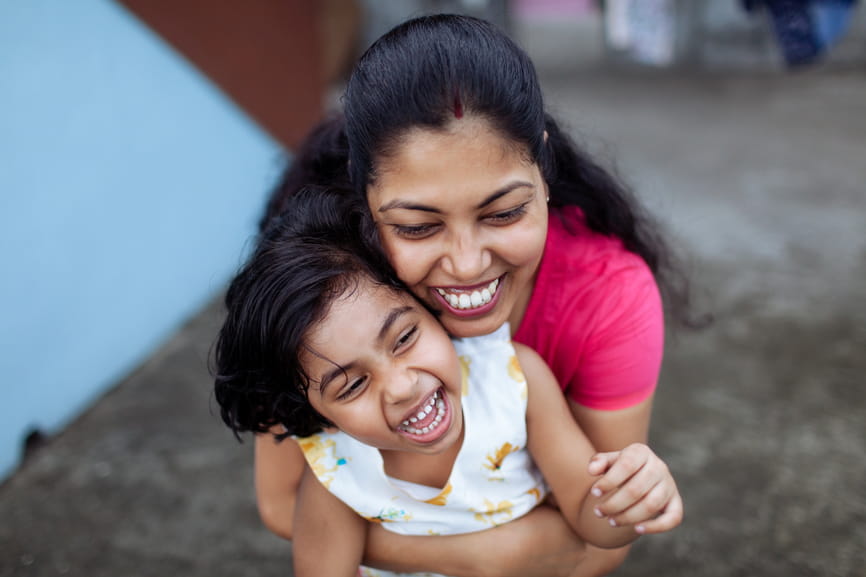After Baby: Supporting New Moms When Days Are Full of Tears

Most parents will name the day their baby arrived in the world as one of their very best days of their lives.
But what if mom doesn’t feel overwhelmed with joy? What if she finds herself crying a few times a day? What if she just can’t find the energy to get out of bed? And what if all of this makes her feel she’s failing as a mother?
“The fact is that most women have some worry and occasional weepiness after they have a baby,” says Dr. Nicole Harrington Cirino, M.D., who heads the Women’s Mental Health and Wellness division for Portland, Oregon’s OHSU Center for Women’s Health.
There are very real reasons for the moodiness—beyond first-days-with-a-newborn exhaustion. Immediately after child birth, levels of hormones like estrogen and progesterone (which are 20 to 30 times greater than normal during pregnancy) drop precipitously. These dramatic shifts can have a profound impact on the chemical-messenger systems of the brain, which in turn can alter a new mother’s emotions, concentration, attention, and response to stress. Fatigue, exhaustion, oversensitivity, loneliness, and crying: These all can be typical responses to these hormonal changes.
The tricky part for a new mom who suddenly finds herself in tears is figuring out whether her reactions are normal, or if she may be exhibiting more serious symptoms associated with post-partum depression, anxiety, or other mood disorders. Doctors call these profound changes perinatal mood and anxiety disorders (or PMAD), and they are not uncommon. One in seven women will experience postpartum depression, or PPD, after their pregnancy.
Here’s how to take care of yourself, and support new mothers, daughters, and friends when they need it—and encourage them to reach out for support if necessary.
1. Prepare for the Possibility.
Women who have a history of depression or anxiety are more susceptible to postpartum depression or other mood disorder. Other risk factors include a strong family history of mental illness, an unstable relationship with the father of the baby, economic hardship, an unplanned or high-risk pregnancy, or twins or triplets. But even women without these risk factors may experience PMAD.
If you think you may be susceptible, get your support team in place. In those early months with a new baby, getting (close to) enough sleep, eating nutritious meals, and taking (some) time to care for yourself can be powerful tools to guard against depression and mood disorders. Talk to your partner, parents, friends, and in-laws about what help you might need—cooking meals, doing laundry, watching the baby while you shower—and what support they can give. Don’t be afraid to get specific!
2. Take Note of Your Feelings.
There is a difference, Cirino says, between “baby blues,” which peaks three to five days after childbirth and resolves within one or two weeks, and more serious conditions. The baby blues is a milder form of depression. “These women are still able to experience joy, and their mood recovers after hours or a day,” Cirino says. “But if a woman’s symptoms persist or worsen for more than two weeks or are severe enough to really interfere with her relationship with her baby, her partner, or her ability to provide care for herself, then she may need more professional support.”
It can be difficult, in those sleep-deprived days, to keep track your feelings, so enlist your partner’s help, or jot down your feelings in your phone, or on a calendar.
3. Talk About the Changes You’re Experiencing.
Don’t sit alone with your thoughts. Cirino recommends talking about it with a trusted friend, partner, obstetrician or primary care doctor. Speaking up, she says, can often be the hardest part.
“Some women who experience this often are successful women who are trying to do everything well and can’t admit they may be struggling and need help,” she says. “They may have no history of mental illness and do not understand it, so they blame themselves and what they think are weaknesses as a mom.”
Fortunately, we’ve become a lot more comfortable talking about PPD, partly thanks to celebrity moms like Hayden Panettiere who experienced overwhelming postpartum depression. “It’s really painful and it’s really scary and women need a lot of support,” Panettiere told People magazine.
4. Depression Is Only One Possibility.
Not all symptoms show up as depression. According to Cirino, many women have heightened anxiety after pregnancy and birth. This can manifest in physical symptoms of anxiety like heart racing, shortness of breath, tremors, feelings of choking, and insomnia. Other women have obsessive thoughts about cleanliness, safety, their infant being harmed, or other worries that they just can’t get out of their head. If you’re not feeling right after giving birth, but it doesn’t seem like “depression,” don’t hesitate to reach out to your doctor or other health care professional you trust.
5. Help a New Mom in Your Life Who Is Struggling.
“Be supportive and listen without judging. Make sure moms get sleep and breaks from childcare to eat, exercise, socialize, and have time to care for themselves,” says Cirino. “Partners can also play the vital role of helping moms arrange mental health appointments and follow through on treatment plans, since sometimes it is hard to initiate and follow through on tasks when you are depressed or anxious.” Most importantly, “Reassure them of how much they are loved and help them be in contact with others who care for them and love them.”




